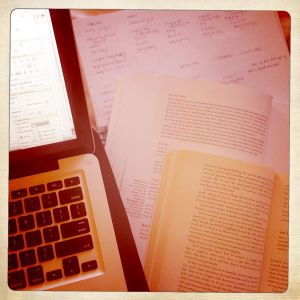It’s May. I’m not sure exactly how that happened… but I am excited that this month is here, mostly because it means the Emerging Writers’ Festival is just around the corner. And this year I’ll be involved in some sessions at the festival, which makes it doubly exciting.
This year, the second weekend of the festival will be held at the beautiful Abbortsford Convent, which is one of my favourite places to wander around on a weekend anyway. That weekend, The Writers’ Retreat, is focused on wellbeing for writers, and the program includes events on parenting and writing, health and writing, balancing writing with life, and nature writing. You can view the full list of events here.
I’ll be involved in two events on the weekend.
Workshop: Yoga and Writing
11am-12.30pm, 1 June 2013
The Salon, Abbortsford Convent
Tickets $15, $12 concession
I’ll be running a workshop on yoga and writing on the Saturday morning. I can’t even begin to articulate how excited I am about running this. For me, yoga is an absolutely vital part of my writing practice. I use it in all sorts of ways, from a remedy for the physical ills that come with sitting hunched over a desk, to supporting and enhancing (I hope) the intellectual and emotional wrangling necessary to get words on a page.
The workshop will be an opportunity for me to share some of the ways that I use a yoga practice to help my writing, but I also want it to be a pretty open format. I’ll be running the class through some of the yoga postures and other practices, but questions and discussion will be most welcome.
I always hope in my yoga teaching to help people develop sovereignty with their own bodies (and minds, for that matter), so that they can begin to use on their own the tools yoga offers for whatever it is that they need. This workshop is no exception. So come along and ask me as many questions as you like!
Seriously. I love it when people ask me questions about yoga.
Symposium: Keeping Active in the Arts
2.30-4pm, 2 June 2013
Rosina Auditorium, Abbortsford Convent
Admission is free
I’ll also be involved in a symposium-style event on the Sunday called ‘Keeping Active in the Arts’. In this session we’ll be talking about the benefits of staying active, and how to actually do that.
Having recently gone back to a job that keeps me at a desk three days a week (as opposed to teaching yoga full-time, like I was in Sydney), I’ve spent a lot of time in the last few weeks mulling over exactly these questions. I’m really looking forward to discussing some of the ideas I’ve had, and getting some new ones from others.
But honestly, the whole weekend sounds like it’s going to be wonderful, so even if you can’t make it to my events, do come along. Here are some pictures I took on a recent visit to Abbortsford Convent — it’s worth coming just hang out in the place.












